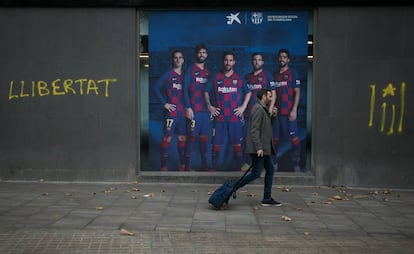Thousands of officers on hand to protect Real Madrid-Barcelona match
Around 3,500 security personnel will be at the Camp Nou for tonight’s game in Catalonia, after the anonymous platform Democratic Tsunami called pro-independence protests there


Around 3,500 security personnel will be on hand to police the soccer match between FC Barcelona and Real Madrid that is due to take place tonight at the Camp Nou in Barcelona. The measures have been put in place given the plans by the anonymously run protest group, Democratic Tsunami, to stage disruptive demonstrations at the event in response to the recent jailing of leaders of the pro-independence movement in the northeastern Spanish region of Catalonia.
Around a thousand officers from the regional force, the Mossos d’Esquadra, will be present at the event, along with 500 members of the National Police and the Civil Guard, and 2,000 private security guards.
Democratic Tsunami wants to secure a global audience for its pro-independence message
Democratic Tsunami wants to take advantage of the huge popularity of the Barça-Madrid match, known in Spanish as el clásico, and secure a global audience for its message in favor of the independence of Catalonia as well as its demands for the release of the imprisoned politicians and civic association leaders. The platform has called for a permanent demonstration at 4pm today at four points around the field under the slogan in English: “Spain, sit and talk.”
Nine of the pro-independence leaders were jailed in October by a Supreme Court ruling that probed the events of 2017, which saw an illegal referendum held in Catalonia and a unilateral declaration of independence subsequently passed by the regional government. The imprisoned politicians include Oriol Junqueras, the leader of the Catalan Republican Left, and Jordi Sànchez and Jordi Cuixart, from pro-independence civil society groups National Catalan Assembly and Òmnium Cultural, respectively.
Tonight’s soccer game between Real Madrid and Barcelona was due to take place on October 26, but was postponed due to the widespread – and sometimes violent – protests that erupted in the wake of the court ruling.
A police escort will accompany both team buses, to avoid protestors from blocking the roads
Past mobilizations by Democratic Tsunami have relied on an element of surprise to cause disruptions, something that has prompted the Mossos d’Esquadra to strengthen the police escort that will accompany both team buses, to avoid protestors from blocking the roads and preventing the players from reaching the stadium.
Mossos inspector Lluís Venteo said after a meeting between the authorities and the club that the priority of the regional force is to guarantee that the players, referees and fans can reach the Camp Nou, and that the game “is played with complete normality.”
To that end, officers began this morning to create a “porous” security cordon, which allows pedestrians and traffic to pass through, but will later be used as checkpoints in order to ensure the area remains accessible. From midday on Wednesday, phase two of the police operation will be put into motion around the surroundings of the ground, aimed at allowing fans to enter the stadium and for the game to go ahead without disruption. This phase will also work to avoid confrontations between radical factions from each side’s fans.
The regional police will be trying to ensure that the protestors assembled by Tsunami Democràtic “will be able to safely demonstrate”
The Catalan government, which is run by pro-independence parties, also explained that the regional police will be trying to ensure that the protestors assembled by Democratic Tsunami “will be able to safely [demonstrate].” Inspector Venteo added that the management of the police deployment is the sole responsibility of the Mossos, and the Civil Guard and the National Police will only be called on for help should “something extraordinary” happen.
Despite this stance by the Mossos, the Interior Ministry has sent the aforementioned 500 or so officers from the National Police and Civil Guard to Barcelona. Police sources confirm that this includes four units of riot police, in addition to two other groups already present in the area. Each group is comprised of around 40 to 50 officers. Civil Guard sources have also confirmed the arrival of a number of squads from Seville.
Sources from the Interior Ministry said that the move was part of the “counter-terrorist effort during the Christmas period” to protect “critical infrastructure” and because of the “large crowds.” “We are still on a level-four alert,” the same sources said, adding that “the Mossos d’Esquadra are responsible for citizen safety in Catalonia.”
But police and Civil Guard unions claim that the fresh deployment of officers in Catalonia “falls within the so-called Operation Icarus,” which was activated when the Supreme Court sentence in the trial of the pro-independence leaders was published on October 14, and that will officially end on December 20, Patricia Ortega Dolz reports.
Despite the risks of the planned demonstration, staff in bars and businesses around Camp Nou said on Tuesday that they had not received any instructions from the Mossos d’Esquadra. “The atmosphere is calm for now,” said a waiter from a bar named La Catalana. “I think that they’re exaggerating.”
“We won’t be putting out our terrace bar as a precaution,” complained David, a waiter from a nearby bar called Kargo’s, who said that no one had alerted him to any risks.
Josep Vives, the spokesperson for FC Barcelona, called for civic behavior and for the “fiesta of soccer” to be compatible with “freedom of expression.” Vives denied that Democratic Tsunami had been in contact with the club, and criticized the “scaremongering” created by the “interest in furnishing a particular narrative” around the clásico.
English version by Simon Hunter.
Tu suscripción se está usando en otro dispositivo
¿Quieres añadir otro usuario a tu suscripción?
Si continúas leyendo en este dispositivo, no se podrá leer en el otro.
FlechaTu suscripción se está usando en otro dispositivo y solo puedes acceder a EL PAÍS desde un dispositivo a la vez.
Si quieres compartir tu cuenta, cambia tu suscripción a la modalidad Premium, así podrás añadir otro usuario. Cada uno accederá con su propia cuenta de email, lo que os permitirá personalizar vuestra experiencia en EL PAÍS.
¿Tienes una suscripción de empresa? Accede aquí para contratar más cuentas.
En el caso de no saber quién está usando tu cuenta, te recomendamos cambiar tu contraseña aquí.
Si decides continuar compartiendo tu cuenta, este mensaje se mostrará en tu dispositivo y en el de la otra persona que está usando tu cuenta de forma indefinida, afectando a tu experiencia de lectura. Puedes consultar aquí los términos y condiciones de la suscripción digital.








































